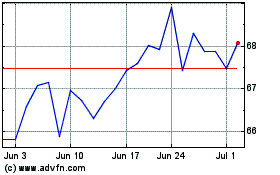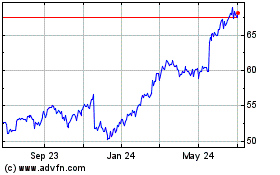Today's Top Supply Chain and Logistics News From WSJ
November 18 2016 - 6:55AM
Dow Jones News
By Brian Baskin
Sign up:With one click, get this newsletter delivered to your
inbox.
Wal-Mart Stores Inc. is making progress in expanding its
e-commerce sales, but at a steep price. The retailer reported a 21%
jump in online sales in the third quarter, but slimmer profits,
reflecting the cost of building out the e-commerce business while
also sprucing up stores, the WSJ's Sarah Nassauer and Joshua
Jamerson report. Wal-Mart's enormous size hasn't immunized it from
the pressures of rising fulfillment costs facing retailers. But
analysts say Wal-Mart's scale could prove valuable during the busy
pre-Christmas shopping season when it could win new customers
looking to pick up online orders at one of the company's thousands
of stores - one of the few advantages brick-and-mortar retailers
have over their online competitors. Whether that will be enough to
turn the tide against Amazon.com Inc., which continues to eat away
at traditional retailers' sales and profits, is another story.
Amazon's investment in logistics in India is paying off. The
company has grabbed nearly a third of the South Asian nation's tiny
but rapidly growing e-commerce market just two years after Chief
Executive Jeff Bezos committed to spending billions of dollars in
the country. Amazon used some tried-and-true tactics, the WSJ's
Newley Purnell reporters, including building state-of-the-art
warehouses. But the online retail giant is trying some new methods
tailored to India's patchy logistics and financial infrastructures,
including a greater reliance on motorcycle delivery men and
allowing customers to pay in cash. Amazon's early success indicates
the company has learned from its failure to gain a foothold in
China, where the retailer built capacity at a slower pace, allowing
homegrown rivals to overtake it. Should Amazon's success in India
prove sustainable, expansion into other emerging markets may be
next.
Some of Amazon's competitors are mimicking one of the company's
most successful tactics on its home turf. Crate & Barrel is
allowing outside partners to sell goods on the home-goods chain's
website, blurring the line between retailer and marketplace and
following in the footsteps of more than 250 companies, including
Wal-Mart and Macy's Inc., the WSJ's Laura Stevens writes. It's a
strategy designed to give consumers more choices without having to
take on additional inventory. However, retailers also take on the
risk that a third party's goods are sub-standard, which can harm
their brands. Amazon faces the same problem; earlier this week sued
companies allegedly selling counterfeit goods on its
marketplace.
INVESTING
A second Chinese logistics company is testing the waters for a
U.S. initial public offering, despite tepid demand for the last
stock sale from the sector. ZTO Express Inc. debuted on the New
York Stock Exchange last month, and its shares have fallen about
20% since then. Now, Best Logistics Technologies Ltd., which like
ZTO supports China's booming e-commerce sector, plans to give it a
go next year. Investors may have pent-up demand for logistics
stocks after more than five years without an IPO in the sector. But
China's fragmented parcel-delivery market is cutthroat, and slowing
economic growth and rising global trade protectionism could make
the headwinds even stronger. Best Logistics may be hoping its niche
in managing warehouses will prove more appealing to investors, or
that its backers - Alibaba Group Holding Ltd. and Foxconn - will be
enough of a draw.
QUOTABLE
IN OTHER NEWS
U.S. consumer prices rose in October for a third straight month.
(WSJ)
U.S. housing starts rose 25.5% in October. (WSJ)
Best Buy Co.'s online sales grew 24% for the third straight
quarter. (WSJ)
Volkswagen AG will undertake a sweeping restructuring of its
embattled passenger-car brand, including up to 30,000 job cuts over
five years. (WSJ)
Amtrak posted its smallest operating loss in decades in the
passenger railroad's just-completed fiscal year. (WSJ)
Bulk carrier DryShips Inc. will raise $20 million through a
convertible preferred share offering to help pay down debt.
(WSJ)
DHL Express will spend $185 million in the U.S. to boost its
e-commerce capacity. (DC Velocity)
Amazon is allowing Prime-eligible merchants to ship items from
their own facilities to free up space at company-owned warehouses.
(Bloomberg)
Argentina is stepping up security at its main grain-exporting
port of Rosario to combat drug trafficking. (Reuters)
The two largest makers of beer kegs are forming an alliance to
improve trans-Atlantic shipping of the beverage. (Global Trade)
BNSF and Kansas City Southern will launch an intermodal service
from Chicago to southern Mexico. (Transport Topics)
United Parcel Service Inc. will add flights between Southern
California and its hub in Louisville during the peak holiday
shipping season. (Air Cargo Eye)
The ports subsidiary of shipping company Nippon Yusen K.K. took
a 20% stake in Maher Terminals, the largest container terminal at
the Port of New York and Jersey. (Port Technology)
BNSF Railway will study the use of physical covers for coal and
petroleum coke trains under a tentative settlement of a lawsuit by
environmental groups. (Seattle Times)
Target Corp. will fulfill online orders from more than 1,000 of
its stores this holiday season. (Internet Retailer)
The Association of American Railroads asked the Surface
Transportation Board to stop rulemaking until Donald Trump appoints
new board members. (Progressive Railroading)
Chinese shipyards built 7.6% less capacity by tonnage in the
first 10 months of the year. (Seatrade Maritime)
ABOUT US
Brian Baskin is editor of WSJ Logistics Report. Follow him at
@brianjbaskin, and follow the entire WSJ Logistics Report team:
@PaulPage, @lorettachao and @EEPhillips_WSJ, and follow the WSJ
Logistics Report on Twitter at @WSJLogistics.
Subscribe to this email newsletter by clicking here:
http://on.wsj.com/Logisticsnewsletter .
Write to Brian Baskin at brian.baskin@wsj.com
(END) Dow Jones Newswires
November 18, 2016 06:40 ET (11:40 GMT)
Copyright (c) 2016 Dow Jones & Company, Inc.
Walmart (NYSE:WMT)
Historical Stock Chart
From Aug 2024 to Sep 2024

Walmart (NYSE:WMT)
Historical Stock Chart
From Sep 2023 to Sep 2024
